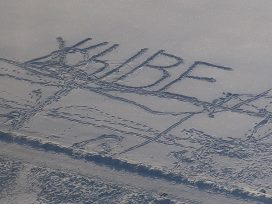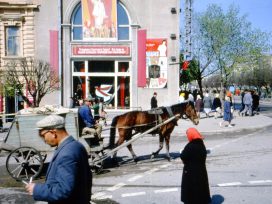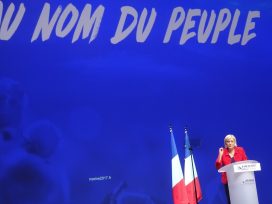The book that I held in my hands in the Princeton University library that day, some ten years ago, was a collection of maps of eastern Europe through the centuries. Holding the pages with my thumb, I let them turn one by one very rapidly. Suddenly, these seemingly fixed borders of states and nations became alive, moving back and forth, expanding and contracting, disappearing and reappearing again, as pages and centuries went by. With a little imagination, I could picture the tides of history in the form of invading armies that erased old borders and established new ones. I could also picture some of their consequences: the fate of terrorized peoples divided from their brethren or entrapped in a hostile national environment, if they were lucky enough not to be ethnically cleansed. That is when my thoughts wandered to the Balkans.
As recently as the end of the twentieth century, relations among peoples in the Balkans resembled very much Hobbes’ famous description of states as human fortresses, posed as gladiators and facing each other with garrisons and guns along their borders, permanently spying on their neighbours and preparing for war. My first memories of such borders take me back to the 1950s, on a boat cruise on lake Prespa with my mother. A uniformed man in a small army speedboat with a machine-gun hanging from his shoulder tried to get onboard to inspect the ship, slipped, the machine-gun went off and he fell to the ground wounded. That is when, as a seven-year old, I understood that our boat had approached a line in the water called the border that separated our part of the lake from the part that belonged to Albania and Greece. The armed men in uniform, as I understood later, were supposed to make sure that nobody crossed that imaginary line or, even worse, that no foreign citizen was smuggled into our country. I must admit: that border looked a little odd to me, since there was no barbed wire, the symbol of the borders in my life until then. The fact that barbed wire could not be erected in the water made things difficult for the people in uniform, I thought to myself, looking at a funny red-painted oil drum that symbolized the border, cheerfully bobbing up and down under the push of each new wave.
The man in uniform lay wounded as panic stricken people rushed to transport him back to the speedboat. The first imprint that this event left on my mind was one of fear: borders were lines of defence against our enemies the neighbours, where one could be wounded or killed. Little did I know then that a long historical legacy of fear and mistrust, one that has separated peoples of the Balkans not only geographically but also emotionally, had left its first scar on my mind. As I grew up I learned of the other emotional borders that tortured the hearts and minds of the peoples of the Balkans – hate, intolerance, prejudice, supremacy… It is these, the borders of our minds, that were the cause of the last Balkan wars in former Yugoslavia at the end of the twentieth century, and that are also at the root of many of our misunderstandings and conflicts today.
After the end of the Cold War, these emotions fuelled the malignant nationalisms that caused the greatest massacres in Europe since the Second World War. Paradoxically, the democratic systems that were introduced after the fall of one-party dictatorships were also one of the causes of the wars. Democracy in its deepest sense is a state of mind of the peoples; in our Balkan case, democracy legitimized a politics that was based on minds polluted by a history of hate, intolerance, prejudice and supremacy. All that was needed were politicians with similar minds, ready to stir up these negative emotions, to create waves of nationalism that would carry them to positions of power. But in order to stay there, a dangerous game was and is still played with the people. In the minds of all the Balkan nations, without exception, there are two maps with two different borders. One is the contemporary map, usually called the political map of one’s state. Usually it is not liked, since its diminished size signifies the wrongs that history has done to the nation. The other is the historical map, a map sometimes secretly and often openly cherished.
This clash of the borders in our minds is not the only proof of the injustice done to “us” by “them” in a region where borders do not follow ethnic lines but cut across them. The other is that often the dignity of the minority is affronted by the majority nation. But, then, only individuals with dignity, meaning those free of fear, hate, intolerance, prejudice and supremacy can respect the dignity of others. Travelling across the borders of our minds is slow and difficult because all of us carry our heavy identity baggage. While we want to drop our swords, leave Hobbes’ world of conflict and enter into Kant’s world of cooperation and transnational ties, we are insecure in the intentions of our neighbours of another nationality. So we concentrate all our efforts on identity formation, on the process of associating ourselves with other individuals or groups. This creates common goals and values based on shared historical experience and is also, necessarily, a process of the “making of the self” through “othering”. That means that national identities have their external others and that, in the Balkans, they are always perceived as threatening. Every nation in the Balkans, where until very recently borders of nations, and even nations themselves, were carved out with fire and the sword, will tell you that history has done them wrong. It is a paradox, but everyone is speaking the truth. Such has been the experience of the Balkans, a region located in a turbulent area of Europe where fate has dealt severe blows to each and every nation. So much so, that in the psyche of our peoples, the “threatening others” often take precedence even over ideas such as progress, peace and prosperity.
Relations between the Republic of Greece and the Republic of Macedonia are a case in point. After the violent break-up of the former Yugoslav Federation in 1991, Greece was faced with the prospect of living with an independent Slav-Macedonian state on its northern border. Greek politics could not, some eighteen years ago, accept the existence of a separate Macedonian national identity, even less the existence of such an identity as a Greek minority. Since Greeks believe that the Macedonian name is part of their historical heritage and should therefore not be used to identify another nation, the new identity was perceived as too challenging to the cohesiveness of the Greek national identity. So much so that the new state was considered a threat to Greek national security and was dealt with accordingly. On the domestic front, nationalist emotions were stirred; on the international front, a crippling economic embargo was imposed and diplomatic war was declared on the new state.
This had its effects, both internationally and domestically, on the new Balkan state. Because of opposition from Greece, Macedonia was taken off the potentially fast track towards Union membership and put back on the Balkan road. This despite the fact that it was the only former Yugoslav republic that achieved independence through a legal process of peaceful self-determination and whose independence, together with Slovenia, was received positively and recognized by the Arbitration Commission of the EU. On the domestic front, Greek nationalism dealt a severe blow to liberal thought in Macedonia and opened the doors to nationalist interpretations of its history and identity. Nationalists, as you know, usually perceive nations as ethnically pure human rockets that travel from the depths of history to the present day: they care little about the actual waves of history that move borders and peoples and even less for the fact that modern nations are a recent product of world society.
But, these historical simplifications have turned the conflict into a grotesque argument between ancient Greeks and ancient Macedonians. Such simplifications complicate relations between the two nations, since they tend to imply that there are unresolved territorial questions between them. The conflict, which foreigners might experience as a Monty Python sketch in which one side cries “Macedonia is Greek” and the other carries banners with maps of historic Macedonia, has become a serious impediment to progress, stability and welfare for the Republic of Macedonia and also for the region, Europe, and the trans-Atlantic alliance as a whole.
The so-called “name issue” between Greece and Macedonia has entered a dead-end. What was originally a demand for a distinction between the name of the new state and the Greek province of Macedonia has turned into demands for a definition of Macedonian identity. Let me explain why. Greek nationalism, by insisting on a geographical distinction such as Northern Macedonia, paradoxically supports Macedonian nationalism’s notion of a divided fatherland. So negotiations must continue for the definition of the nation and the language. But this is something that political leaders will resist, since identity, a highly emotional issue that unites, can also divide societies. This will go on until we realize that we are debating a non-existent issue, since there is no identity problem between our two nations: we speak a different language and have a different history.
Regardless of our misunderstandings, we have to live together. Our territorial Balkan borders, often an impediment to trade and human contact, are an anachronism in today’s Europe. We are privileged to live on a continent where, some sixty years ago, the western European states, having learned the lessons of war, started a peace project called the European Union. Under the military umbrella and with the financial aid of the United States during the Cold War, western Europe developed a supranational structure that transcends borders and nations, instigating the free flow of transnational exchange. The essence of international politics in the European Union is no longer conflict between states, but transnational social relations that connect individuals. Today, we are becoming part of the same peace plan. Of course, the European Union is not a substitute for states, but an addition to them, obliging us, as sovereign states, to resolve our differences and thus contribute to peace and stability in Europe.
If we want to join a community of democratic states that does not go to war with each other, we in the Balkans must disarm our minds. In order to do that, politicians must lead their peoples across the borders of fear, hate, intolerance, prejudice and supremacy that have shaped people’s characters for centuries. “Character is fate”, wrote Heraclitus, quoted the other day in the New York Times. Below it was a simple reader comment: “The character of a nation is not just the character of its citizens but is shaped by its leadership”. Why the lack of leadership that would shape the new character of our nations in the Balkans? Because such leadership means risking falling on the wrong side of public opinion and being called a traitor. Since politicians want to win elections, it is safer to exploit peoples’ fears, to have enemies to put the blame on. At the end of Constantin Kavakas’ poem, when messengers ride into town with news for the fearful people that they have nothing to fear since there are no more barbarians at the borders, someone murmurs with regret: “They were a kind of a solution”. I never reflected on who that person might be. Now I am sure: he was a politician.
Franz Fanon wrote: “Each generation must out of its relative obscurity, discover its mission, fulfil it or betray it”. The mission today, not only of my generation, but your generation too, is to cross these borders of fear, of hate, of intolerance, of prejudice and of supremacy in the Balkans. Our common mission is nothing less than to change the course of Balkan history, which until now has been a never-ending narrative of events that, through conflicts and wars, have caused us to fear each other. We have a different Balkan story to tell today: the story of peoples with dignity that respect the dignity of others.
I dedicate these thoughts to the memory of your fellow student Borjan Tanevski, who crossed a border in order to live and study with students from Greece and other countries. By doing so, Borjan also crossed the borders of our minds.
Speech given at the 5th International Student Conference 2008, “Borders and Nations – What is their role in the Europe of the future?”, American College of Thessaloniki, 25 October 2008. Thanks to the Borjan Tanevski Memorial Fund.






